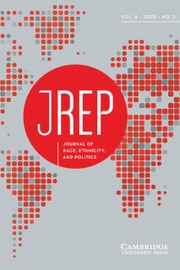Article contents
Voter registration and political knowledge among American Indians
Published online by Cambridge University Press: 06 May 2021
Abstract
This research utilizes a valuable data source to explain voter registration and political knowledge by Native Americans, testing theories of the political engagement of minority populations. After taking account of socio-economic resources, American Indians exhibit lower rates of voter registration and political knowledge compared to Caucasians but similar to that of Hispanics. Relative to other racial groups, military service greatly enhances American Indian political knowledge and voter registration. This finding is especially noteworthy given American Indians' high rate of military service.
- Type
- Research Article
- Information
- Copyright
- Copyright © The Author(s), 2021. Published by Cambridge University Press on behalf of The Race, Ethnicity, and Politics Section of the American Political Science Association
References
- 1
- Cited by




